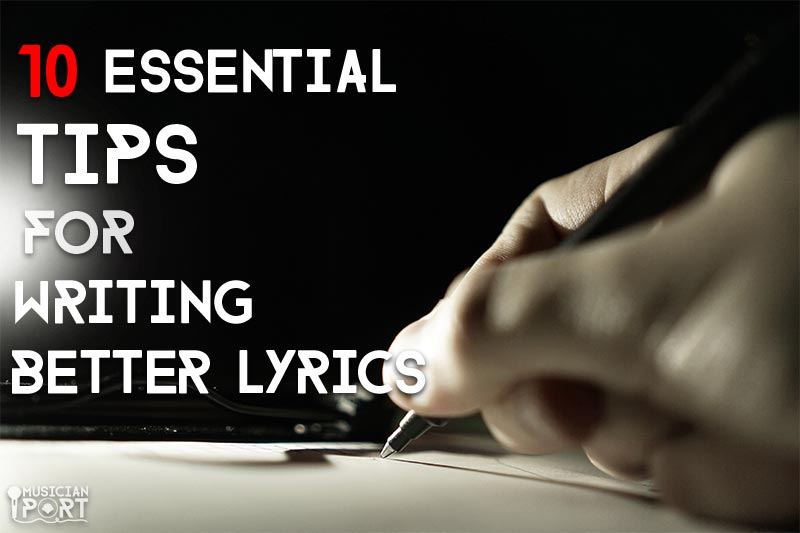Last updated on May 2nd, 2019 at 11:16 pm
The lyrics to the songs you write often offer the most expressive details of the message you are trying to portray in your music. You can share how you are feeling, past experiences, inspiration, and much more through the lyrics of your songs. But for any songwriter, we should always strive to improve our craft. This is when we start asking ourselves, “How can I start writing better lyrics for my songs?”
As a songwriter for many years now, I’ve constructed a list of tips that I have gathered from my past experiences in the hopes of helping anyone who wants to improve their lyric writing abilities.
Here are 10 essential tips for writing better lyrics.
Table of Contents
- 1 1. Finding Inspiration for your Lyrics
- 2 2. Choosing your Song’s Theme
- 3 3. Understanding Syllabics and Rhyming Scheme
- 4 4. Practice Using Literary Devices
- 5 5. Start Reading More
- 6 6. Analyze Lyrics from Songs
- 7 7. Write Lyrics Without Music
- 8 8. Freewriting
- 9 9. Collaborate While Writing Lyrics
- 10 10. Persistency is Key (Keep Writing Lyrics)
- 11 Final Thoughts
- 12 More to Read:
1. Finding Inspiration for your Lyrics

I found a lot of songwriting inspiration during my trip to Japan back in 2017.
One of the first things I do as a lyricist is finding inspiration for lyrics, which can be found anywhere and at anytime. You really have to think with a different type of mindset that allows you to interpret things in a creative way.
Like I mentioned in the 11 Songwriting Tips That Can Be Used Forever article,
“I find myself searching for inspiration for my next song in my everyday life. It’s like I put on some special songwriting lens that has me constantly aware of how things can be interpreted into a song.”

I try to interpret the many different situations I find myself in into lyrics throughout my everyday life.
It’s like analyzing your thoughts in a creative way, helping you get into a creative mindset.
Analyze each situation by trying to understand how it physically and mentally makes you feel.
Now start gathering up ideas for potential songs from the different types of inspirations that you find.
Transforming Emotions into Lyrics
This is when things get interesting.
Once I have found something that inspires me lyrically and established how something makes me feel, the songwriting process can begin. Writing from your emotions is a good way for you to express yourself through your lyrics and helps make your song sound more personal. I usually create a list of questions that help me figure all of this out.
Questions I ask Myself Before I Start Writing Lyrics Based on Emotions:
- What type of emotions am I feeling right now?
- What type of environment am I in right now?
- How did I end up in this situation?
- What type of people is around me?
- Are there any specific details that I may be overlooking?
- Can I relate this thing or situation to one of my past experiences?
- Can I relate this thing or situation to someone else’s past experiences?
Asking myself these questions assist me in creating a foundation for the song I am planning to write. Without this foundation, I often have a difficult time when it comes to putting together the lyrics for the actual song.
2. Choosing your Song’s Theme
When writing your lyrics, keep in mind that every good story has a message that the writer is trying to portray.
Establishing a clear theme before you start writing your lyrics will help give your song the proper foundation. This will allow you to have a smoother songwriting process, especially when it comes to your lyrics.
It helps you create a sense of direction of where you want to take your song.
Once you have a theme established, you can begin writing your lyrics.
Surround your theme with lyrics that help share your message in your own personal, unique way.
Make it personal.
Writing from a personal point of view will help in writing better lyrics for your song by giving your listener a better understanding of your world.
Even if the song you are writing about isn’t about you, you can still add your own personality to the song.
These guidelines will help develop the theme for your listener:
- The details of the theme are explained throughout the verses of the song
- The chorus summarizes the main message you are trying to send to your listener
- Your song identifies the 5 W’s. Who, What, Where, When, and Why
- If a bridge is added, make sure that the bridge helps to reflect upon what was previously said and reinforces the main message/theme of the song
- You can clearly identify your own theme of the song after listening to it
“Having a clear theme for your song is very important, so make sure to keep these guidelines in mind when writing your lyrics.”
(11 Songwriting Tips That Can Be Used Forever)
Now let’s talk about some of the technical aspects of lyric writing.
3. Understanding Syllabics and Rhyming Scheme
Understanding your song’s syllabic structure and rhyming scheme is very important when it comes to writing better lyrics.
Syllabics: Being conscious about how many syllables are in each line which can often correspond with the rhyme schemes used in your songs.
Rhyme Scheme: The pattern of rhyme that comes at the end of each verse.
Understanding both syllabics and rhyme schemes will help you in writing better lyrics for your songs. Let’s talk about both of them now.
The two most common rhyme schemes are the AABB rhyme scheme and the ABAB rhyme scheme.
AABB:
A: I like to write songs that rhyme
A: I do this all of the time
B: It can be really easy to do
B: So go out and try something brand new
ABAB:
A: I like to write songs that rhyme
B: Because it’s so easy to do
A: I do this all of the time
B: So I always find something brand new
Now that you know what some simple rhyme schemes look like, we can talk about more complex structures.
Instead of writing your lyrics in simple formats such as AABB and ABAB, try out some other rhyme schemes.
For example, a rhyme scheme that I enjoy using in my songs is ABCCB.
ABCCB:
A: It looks like a good day to write a song
B: Since it’s something I’ve been meaning to do
C: I’ll write from the start
C: Feelings from my heart
B: All of the feelings I’m feeling for you
This adds some technicality to the rhyme structure of your song.
Try to play around with different rhyme schemes, but don’t try and force it.
Now my question is, were you paying attention to the number of syllables I used in this example?
Let’s break it down:
A: It looks like a good day to write a song (10 syllables)
B: Since it’s something I’ve been meaning to do (10 syllables)
C: I’ll write from the start (5 syllables)
C: Feelings from my heart (5 syllables)
B: All of the feelings I’m feeling for you (10 syllables)
The syllabic structure I used for these simple lyrics compliments the rhyme scheme.
Having a syllable count that matches for each rhyme makes the song sound more structured and clean.
It keeps the song well organized and makes it easier for the listener.
It’s okay to try something different
Now, syllabic structure and rhyme schemes are important, but sometimes you can create something amazing by breaking some rules.
A lot of songwriters and artist create songs that don’t follow any particular rhyme scheme or syllabic structure all of the time.
However, once you have a better understanding of syllabics and rhyme schemes, you then can play around with it when writing lyrics.
This gives you the opportunity to add your own personality to your song, while still having a foundation of understanding when it comes to your rhyme schemes and syllabic structure.
Overall, being knowledgeable about syllabics and different rhyme schemes will help you in writing better lyrics so make sure to keep it in mind when writing.
Don’t Focus too much on Rhyming
You’d think that when writing lyrics to a song, you have to rhyme in every single line.
This isn’t always the case and trying to rhyme too much may even take away from the song you are writing.
Remember that every part of your song, whether it be the music or the lyrics, play an important role. If you are constantly trying to fit a rhyme into your song, just for the sake of rhyming, you may miss out on opportunities to deliver your message in a more impactful way.
4. Practice Using Literary Devices

Understanding the many literary devices allows you to have more to work with when constructing the lyrics to your song.
Here are some of the literary devices you should be familiar with and should consider using as a songwriter.
Metaphors/Similes:
Metaphors and similes are both used to make comparisons to two things that are completely different. The difference is that similes use more direct words to make the comparisons such as “like” or “as”. Metaphors are more subtle with their comparisons and don’t use direct comparison words.
Imagery:
Imagery is when words are used to create images in someone’s mind. It’s when words describe objects, actions, and ideas in a way that appeals to our 5 senses. (Taste, Sight, Touch, Smell, and Sound.)
Alliteration:
Alliteration is when the beginning consonant sound is repeated multiple times, providing a rhythmic sound to the words being used.
Personification:
Personification is when you give human qualities to an object, animal, or idea.
Symbolism:
Symbolism is the use of symbols to represent ideas or qualities that are generally understood by people. Used to create an emotional response.
Point of View:
Point of View is the view or angle that the story is being narrated from.
Literary devices are always used to enhance different types of literature such as stories and poems.
Write your song with literary devices in mind as it will add more creativity and technicality to your lyrics.
For more information about literary devices, check out http://literary-devices.com/
Continue to familiarize yourself with literary devices and different styles of writing. You’ll see an improvement in your songwriting abilities and you will be writing better lyrics in no time.
5. Start Reading More
As a songwriter, it would be wise to constantly expose yourself to the art of writing because there is a lot you can get out of reading different types of materials such as books, poetry, magazines, articles, etc.
Constantly exposing yourself to different writing styles and material can potentially help you improve your own writing.
The more you read, the more writing techniques you can see being used in action. You will be able to see the different styles of writing that you like and the styles that you don’t like.
You’ll also be able to experience the different types of literary devices being used by different authors in their writing. It’s surprising to see how imaginative and technical someone can be with the words they write.
Become more familiar with the art of writing and it will definitely show in your songwriting.
Songwriting is still a form of writing, so have the mindset of a writer and be eager to indulge yourself into different forms of writing.
Songwriting Benefits for Reading More
- You can find more inspiration and ideas for song themes and lyrics
- Gain a better understanding of how different literary devices are used
- Expands your vocabulary by exposing you to new words
- Helps you be more creative
- It can help you with writer’s block
So if your goal is to start writing better lyrics, you should start exposing yourself to the many different types of literature the world has to offer.
6. Analyze Lyrics from Songs

When you analyze another artists’ lyrics, you begin to think more creatively as you try to interpret the messages in their songs.
The lyrics in songs all have meanings that the songwriter/lyricist is trying to present.
Trying to find the messages and meanings that are in songs makes you think in a way a songwriter/lyricist thinks.
We also expose ourselves to different styles of writing and music which helps us gain more influences as a musician, songwriter, and as a person.
If there is a particular artist that you enjoy listening to, pull up the lyrics while you listen to the song and analyze them. Try and see what makes the song so meaningful, or what type of literary devices this artist is using to make the song flow so well.
See if the artist is constantly using the same rhyming styles or if they change it up throughout their songs.
This process helps you as a songwriter develop your own style and helps you understand what types of music you enjoy personally.
7. Write Lyrics Without Music

This can work and I’ve seen a lot of success with it in my own songwriting, but why not try and write your lyrics without any music first.
When we put together the music before the lyrics, we might find ourselves limited when we write. We limit ourselves to the music that we have composed for the song which may lead us to force lyrics to fit.
Maybe you have this lyric that you put together that you thought was perfect but came to find out that it didn’t fit the music that you have put together so you decide to scratch the lyric idea. Maybe you adjusted the lyric so it would fit the music better, but it took away all of the impacts that it had in its original form.
When I first tried this songwriting technique of writing a song with no music, I found myself amazed by the type of lyrics I was able to put together. There was less stress of trying to fit the lyrics together with the music which allowed me to try new things without any musical limitations.
You can always add the music later:
If your main focus is to write the best lyrics you can possibly write than prioritize it in the songwriting process. You can always work on the music that accompanies the lyrics later. You may also find it easier to compose the music for your lyrics instead of the other way around.
If you do choose this route, write without any worry of limitations. It would be good to keep in mind a certain type of sound that you want for your song so when you do start making music for your lyrics, you’ll already have an idea of what you want it to sound like.
8. Freewriting
Freewriting is a writing technique in which a person writes continuously for a set period of time without regard to spelling, grammar, or topic. It allows a person to write freely without the fear of judgment and criticism while potentially increasing the flow of ideas that one has.
This is a very good writing exercise that will help you in your efforts of writing better lyrics for your songs.
Whenever we write, we can find ourselves censoring out some of our ideas due to the fear of judgment and criticism. We may feel that the things we write need to be completely perfect to be accepted by anyone.
This is when the freewriting exercise comes into play. While freewriting, we allow ourselves to write whatever comes to mind, without any worries of what people think because no one else will be seeing it.
We are able to further explore our thoughts and ideas and possibly find something new.
We break down the walls of limitation that may be hindering our writing potential.
As a songwriter/lyricist, it is important for us to allow ourselves to explore our ideas, thoughts, and emotions. We’ll be able to express ourselves further and help us discover new things about how we feel.
You will have a sense of freedom when you write and it can spark your creative juices to start flowing.
There will be a visible difference in how you write afterward which could potentially lead to a better song that expresses what you want to share.
How to Freewrite
There are many ways you can engage in freewriting, but there are two exercises that I believe will be beneficial for any songwriter/lyricist.
Freewriting Exercise 1: Song Theme
- Select a main topic or theme that you want to write about. It will be more beneficial if the topic or theme matches the song you are working on.
- Set a timer for 10 minutes. Make sure not to exceed the 10-minute mark.
- Once you are ready, begin writing for 10 minutes.
- Make sure to not erase anything you write or try to go back to anything that was previously written.
- Once you hear the alarm for your 10-minutes, stop writing.
- Read what you have written and analyze what you have discovered from your freewriting session.
- Highlight anything that stands out to you.
- Now you can use what you have written as a reference while you write lyrics.
Freewriting Exercise 2: Song Continuation
This exercise is good for any current song project that you are working on. Whether you are stuck on a part of a song you are writing or you’re just taking a break from writing lyrics, this exercise will be beneficial for you.
- Find a part of the song that you are working on that you can continue from.
- Again, set a timer for 10 minutes and make sure to not exceed the 10-minute mark.
- Before starting, read the current lyrics you have so you can have an idea of the song’s story.
- Once you are ready, begin writing for 10 minutes. You don’t have to write lyrics, just write what you are feeling at that moment after reviewing your song’s current lyrics.
- You may find yourself writing about how you are feeling, what you want the listener to feel, where you want to take the song, lyric ideas, and even musical ideas.
- After you hit the 10-minute mark, stop writing.
- Analyze what you have written
- Highlight the material that stands out to you.
- Organize what is highlighted in categories such as lyric ideas, story ideas, theme ideas, etc.
- Now you have something you can use as a reference to continue the song you are currently working on.
I really enjoy this exercise because it allows me to get a better idea of what my song is about.
This exercise also helps with writer’s block, as it helps you expand on your ideas and makes you think creatively.
Overall, freewriting is a very good exercise for songwriters and it will definitely help you write better lyrics in the long run.
9. Collaborate While Writing Lyrics
Writing lyrics can be very challenging, especially if you’re writing a song all by yourself. One of the best ways to write lyrics is working on them with another person(s).
Turning this task into a collaborative effort can easily make the lyric writing process less of a headache.
Working on your lyrics with other people allows for more creative ideas to be put into the mix. Not only will you be able to use your own ideas while writing your song, you’ll have the opportunity to bounce your ideas around with the other people you are working with.
You also can have another opinion on your current ideas and lyrics and see if there’s any way you can improve what you already have written down.
Do keep in mind that when working with other people on a song project, your work may be judged or criticized in the process of writing the song. Don’t take any of the criticism personally and be professional about it.
Take all of the opinions and criticism into account while writing your song because, in the end, your goal is to make a song that you are proud of.
You’ll be surprised at what can happen to your song when working with other people.
While it can all be a positive experience, don’t forget to trust your own gut too. If you feel that the constructive criticism that you are receiving won’t be any help and is actually turning the song into something you don’t want it to be, then take matters into your own hands.
10. Persistency is Key (Keep Writing Lyrics)
You hear it from everyone, “Practice makes perfect!” This is as true as it gets when it comes to songwriting and writing lyrics.
Songwriting and writing lyrics is a skill that you need to continue to develop and work on. You will definitely write some bad songs here and there, but it will be all worth it once you write a song that you can be proud of.
If you want to start writing better lyrics for your songs, you’re going to need to practice as much as you can. If possible, every day.
Constantly work on your craft as a songwriter/lyricist and always find ways to innovate your writing style.
Approach the songwriting process in different ways and don’t be afraid to try something new.
Just keep writing and don’t let anything hold you back!
Final Thoughts
Well, there you have it, 10 essential tips that will help you in your goal of writing better lyrics for your songs. Hopefully, these tips have helped you develop an idea of what is needed to be done if you want to improve as a lyricist.
Keep working hard on improving your lyric writing abilities and you’ll see yourself evolve as a songwriter in time.
Just remember to always keep your mindset open to learning more about the art of songwriting. Always seek to improve your craft.
And don’t be afraid to ask for feedback on your lyrics. It’s one of the most important things to do if you ever want to improve as a songwriter/lyricist. Feedback is necessary if you ever want to grow as a songwriter as it can reveal to you what you need to improve on. Sometimes all it takes is for someone to say that you can do better to actually take action and try to improve your lyric writing abilities.
If you want to read more about how you can improve as a songwriter, check out this article on 11 Songwriting Tips That Can Be Used Forever
More to Read:
- 11 Songwriting Tips That Can Be Used Forever
- 12 IMPORTANT Tips for Performing Live – THE ULTIMATE GUIDE
- Can Anyone Learn to Sing? (Natural Talent vs Hard Work)
- 10 Life Lessons That I Learned from my Singing Teacher
- How to Sing with True Emotion (A Musical Moment)







Leave a Comment